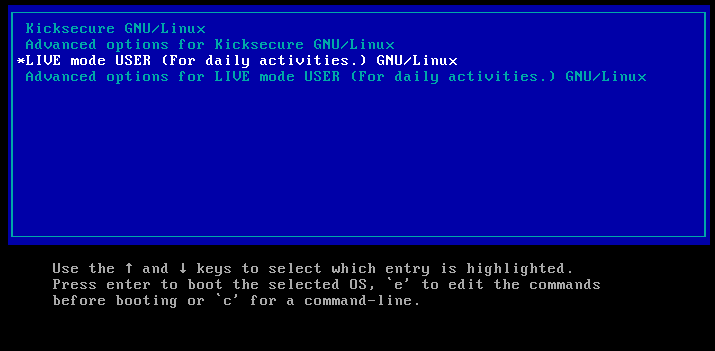Types of Virtual Machines: What’s right for you?
The two most popular open source VM options are Oracle’s Virtual Machine and KVM Virt Manager (also going by QEMU)

Update:
Check our new VPN, which is faster and leaner than a VM: Click Here To Learn
Types
In our previous articles we discussed what browser fingerprinting is and how Big Tech firms maliciously use it to gather data on you and sell it. But you can defy them and avoid fingerprinting by using virtual machines.
The two most popular open source VM options are Oracle’s Virtual Machine and KVM Virt Manager (also going by QEMU). We’re now going to go over the differences between them and which one you should be using under different scenarios. Also you can take your cybersecurity game to the next level, by subscribing for free to our new content by email, by Session messenger, via RSS feed, our Ethereum push notification channel, or on Nostr.
Oracle’s Virtual Machine
The irony of Virtual Machine is that it’s made by Oracle, one of the very largest database brokers selling cross-device fingerprint data on billions of people. Yet despite the irony of a fingerprint data broker being the creator of software to defeat fingerprints, Virtual Machine is one of the easiest for beginners to setup and use VMs.
VirtualBox is easier for beginners
And no, Oracle can not gather data on you from your use of Virtual Machine software because it’s open source and has been reviewed by millions of people worldwide. There is no spyware in the software itself. Oracle gathers data from it’s vendor relationships with millions of different platforms and websites.
Advantages of Oracle VM
The main advantage of Virtual Machine is that it’s easy to setup and use. Another huge advantage is that you can have a VPN on your host machine, and the virtual machine will think that’s your real location. So for example if you have Linux on the host with a VPN, and Microsoft Windows inside the Virtual Machine, then you’ve tricked Microsoft into thinking you’re really at that location.
A Linux Host can run a Microsoft Windows VM
While as if you ran the VPN inside of Windows itself, then Microsoft can see through it because the operating system has higher privileges than the VPN.
It’s not just Microsoft Windows that can see through VPN clients. Many different types of software (especially on Windows) will try to pierce through and get higher privileges. By having the VPN on the host through Oracle’s Virtual Box, you make it impossible for them to know your real IP address and therefore identity and location.
Disadvantages of Oracle VM
The company Oracle itself is not transparent about what bugs or security flaws have been reported. Also Oracle has not fixed flaws in a timely manner. There are some extreme examples of a security bug back in 2008 not being fixed for 4 years, despite the Oracle team knowing about it.
Tough to Modify
Another disadvantage is Oracle made it difficult for people to modify the Virtual Box software. While random people on the internet can still compile it to check that it’s open source code matches the real product, the version you can modify has it’s BIOS compile in a way that requires the official company to do it.
This technically does not meet the definition of “free software”, which puts it in a primarily ideological conflict with the Linux community.
Straight Truth
In plain English, Oracle Virtual Box does a great job of allowing someone who isn’t that tech-savvy to evade browser finger printing and VPN penetration. But the company itself has a shady history and clearly doesn’t care about the philosophy behind freedom respecting software.
The other main option is KVM…
KVM stands for Kernel Virtual Machine
Advantages of QEMU KVM
Speed
The main advantage of KVM is it’s faster. The reason it has better performance is because it runs the “computer simulation” directly on a core part of the host’s operating system, called the kernel. That’s why it’s named ‘KVM’, for ‘Kernel Virtual Machine’.
So KVM should be used for live video and gaming activities, where high performance and fast processing speeds are crucial.
KVM creates virtual machines of any type directly on the Linux kernel. This gives it speed and versatility
Disadvantages of QEMU KVM
VPN on Host
The main disadvantage of KVM is that you can NOT run a VPN on the host operating system. If you do, the KVM will loose internet connection because it’s running directly off the operating system’s core and therefore a VPN would be competing and not working with the KVM’s networking.
Fool Microsoft
So if you want to run Microsoft Windows in a KVM and you also want to fool Microsoft into thinking you are at a VPN’s location, then you need to put the VPN on a router. This costs money and is more time consuming to average new Linux user. And these same concepts apply to any type of software that might pierce through a VPN.
Copy Paste
Another disadvantage of KVM is that you can’t use the highest quality hardware acceleration at the same time as having copy paste functionality from the host to virtual machine. This may seem like a random choice to make but the reason for this conundrum is these things require different “modes” that compete for the same resources.
In other words, KVM forces the user to choose between either getting real fast graphics or copy & pasting from the host computer to KVM.
Update:
Check our new VPN, which is faster and leaner than a VM: Click Here To Learn
How to Setup up VMs?
Don’t miss out, subscribe for free to our new content by email, by Session messenger, via RSS feed, our Ethereum push notification channel, or on Nostr. Simplified Privacy offers custom guided KVM and Virtual Machine setups and technical support. In your personal consultation, we’ll guide you through your choice of audio, video, or live texting chat on how to setup or customize these VMs to meet your privacy needs.
Don’t make mistakes that slow down your internet or computer with a bad setup. Your consultation would be end-to-end encrypted on easy to use apps like Signal or Session, for anonymous cryptocurrency.
Reject corrupt Big Tech’s browser fingerprinting from maliciously being done to you and Liberate your computing today!
If you really want to learn and take your privacy to the next level, Learn about HydraVeil, Access our VPN, and subscribe to our new content via: Arweave Video RSS, Podcast RSS, Session list, Nostr, Bastyon, Article RSS, or join the Signal Group
Related Posts

Why KVM Whonix over Oracle VirtualBox
KVM and VirualBox are two ways to use Whonix. Let's discuss why KVM is better.
[SP]
Feb 1, 2024

VM Burner Phones: Complete Guide
Did you know that you can create a virtual machine of a DeGoogled Android on your desktop Linux PC, to create infinite fast burner phones to isolate spyware apps?
[SP]
Dec 24, 2023

Virtual Machines for Privacy 101
A Virtual Machine is a software emulated recreation of a smaller computer that runs in an isolated partition of a real physical computer’s hardware.
[SP]
Aug 17, 2022

Whonix 101: The Best Way to Use Tor
[SP]
Jan 1, 0001